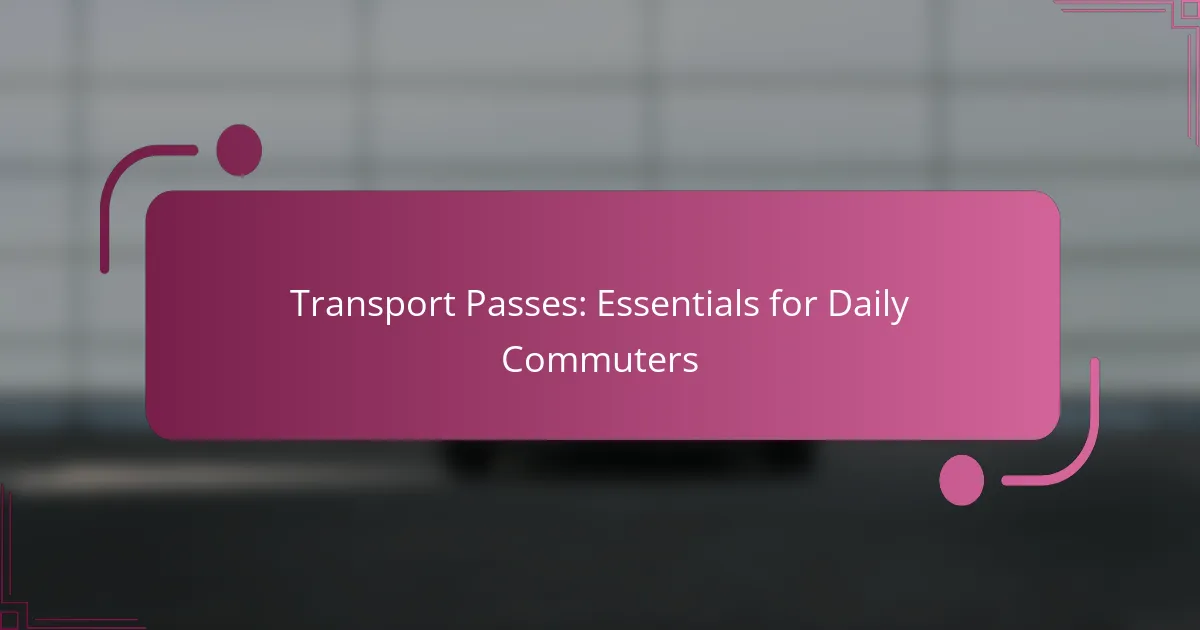Transport passes are essential tools for daily commuters, offering various options like monthly, annual, and daily passes to suit different travel habits. By selecting the appropriate pass, commuters can enjoy significant savings and the convenience of unlimited travel, making budgeting for transportation easier. Additionally, eligibility criteria often support specific groups, ensuring fair access to these valuable resources.
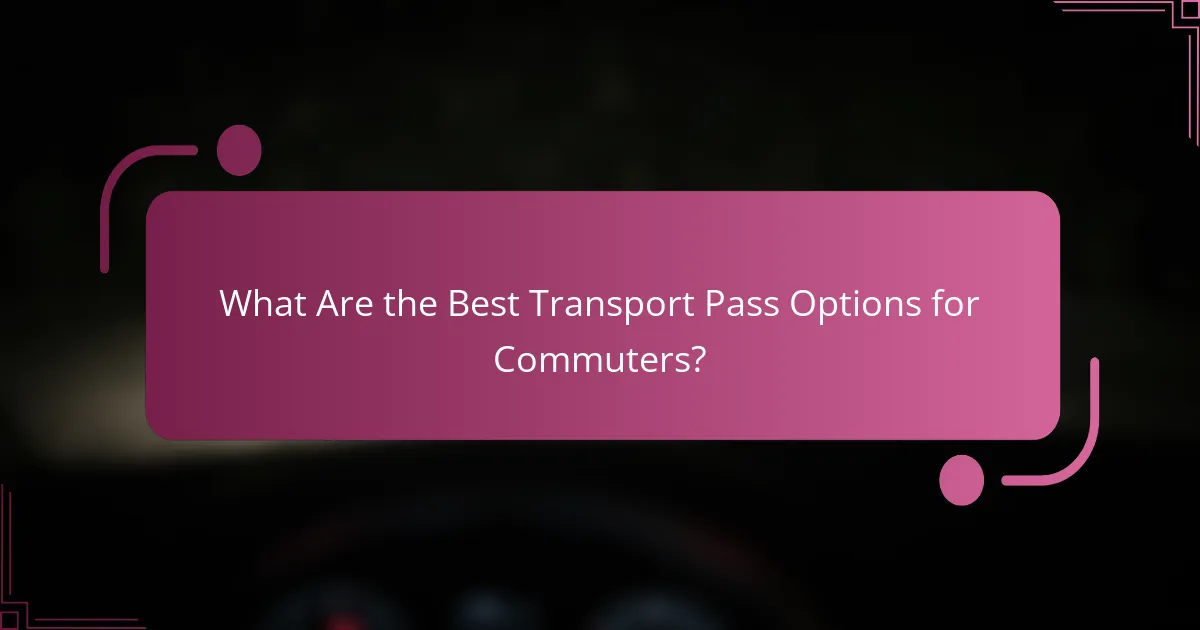
What Are the Best Transport Pass Options for Commuters?
The best transport pass options for commuters include monthly, annual, and daily passes, each tailored to different travel needs and frequencies. Choosing the right pass can save money and provide convenience based on how often you use public transport.
Monthly Passes
Monthly passes are ideal for regular commuters who travel frequently within a month. They typically offer unlimited rides on buses and trains within a specific zone, making them cost-effective for daily use.
Prices for monthly passes can vary significantly depending on the city and the transport network, often ranging from around $70 to $150. Consider your commuting habits to determine if this option provides savings compared to single-ride fares.
Annual Passes
Annual passes are designed for those who commute regularly over the year, offering the best value for long-term users. They usually come at a discounted rate compared to purchasing 12 monthly passes individually.
In many cities, an annual pass can save commuters up to 20-30% compared to monthly passes. This option requires a larger upfront payment but can be beneficial if you plan to use public transport consistently throughout the year.
Daily Passes
Daily passes are suitable for occasional users or those who only need to travel for a day. They provide unlimited rides within a specified period, typically 24 hours, making them convenient for short-term needs.
Prices for daily passes generally range from $5 to $15, depending on the city. This option is ideal for tourists or individuals who may not need regular access to public transport.
Student Discounts
Many transport networks offer student discounts on monthly and annual passes, making commuting more affordable for students. These discounts can significantly reduce the cost, often by 25-50% off regular prices.
To qualify, students usually need to present a valid student ID or enrollment verification. It’s advisable to check with local transport authorities for specific eligibility requirements and available discounts.
Senior Citizen Passes
Senior citizen passes provide reduced fares for older adults, often allowing for free or discounted travel during off-peak hours. These passes are designed to make public transport more accessible for seniors.
Eligibility criteria and discounts can vary by location, but many cities offer substantial savings, sometimes up to 50% off standard fares. Seniors should inquire about specific programs available in their area to maximize their travel benefits.
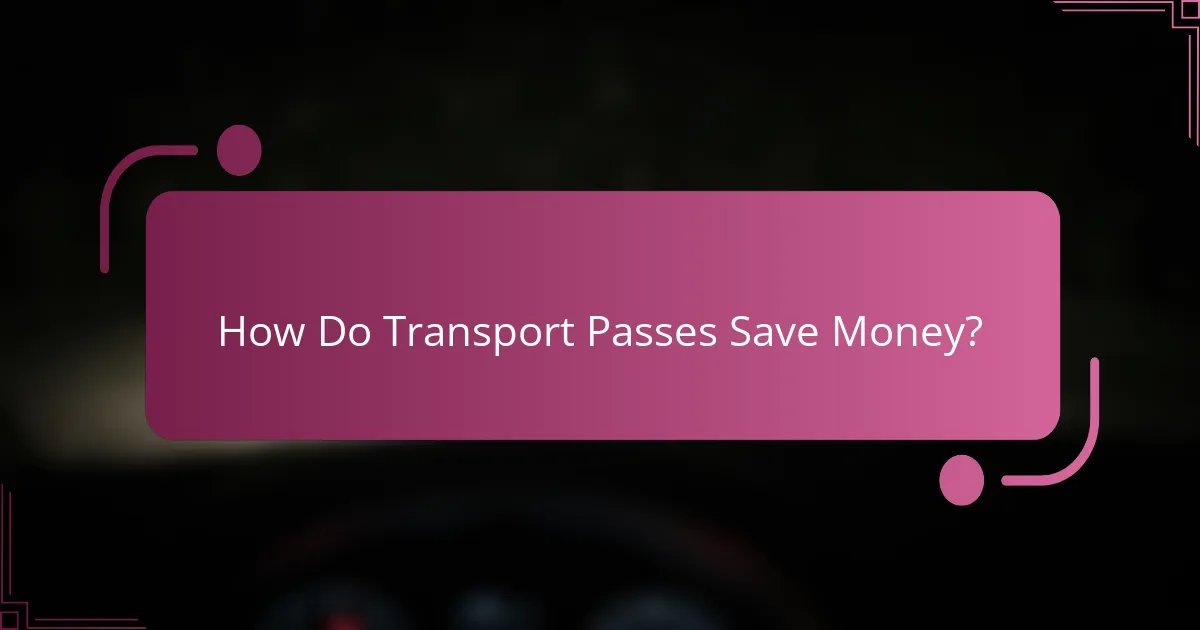
How Do Transport Passes Save Money?
Transport passes save money by offering discounted rates for frequent travelers compared to purchasing single tickets. These passes are designed for daily commuters, allowing them to budget more effectively while enjoying the convenience of unlimited travel within a specified period.
Cost Comparison with Single Tickets
When comparing transport passes to single tickets, the savings can be significant. For example, a single ticket for a bus or train ride may cost around $2 to $5, while a monthly pass might be priced between $70 and $120, depending on the city. If a commuter takes the bus or train daily, the total cost of single tickets can quickly exceed the price of a pass.
Additionally, many transport systems offer discounts for students, seniors, or low-income individuals, making passes even more affordable. It’s essential to evaluate how often you travel to determine if a pass is worth the investment.
Long-Term Savings Analysis
Long-term savings with transport passes can be substantial, especially for those who commute regularly. Over a year, a monthly pass can save hundreds of dollars compared to buying single tickets. For instance, if a commuter spends $4 on a single ticket and travels 20 days a month, that totals $80, while a pass may only cost $70.
Moreover, some transport authorities offer annual passes that provide even greater savings, often reducing the monthly cost further. Commuters should assess their travel patterns and consider purchasing a pass that aligns with their needs to maximize savings.
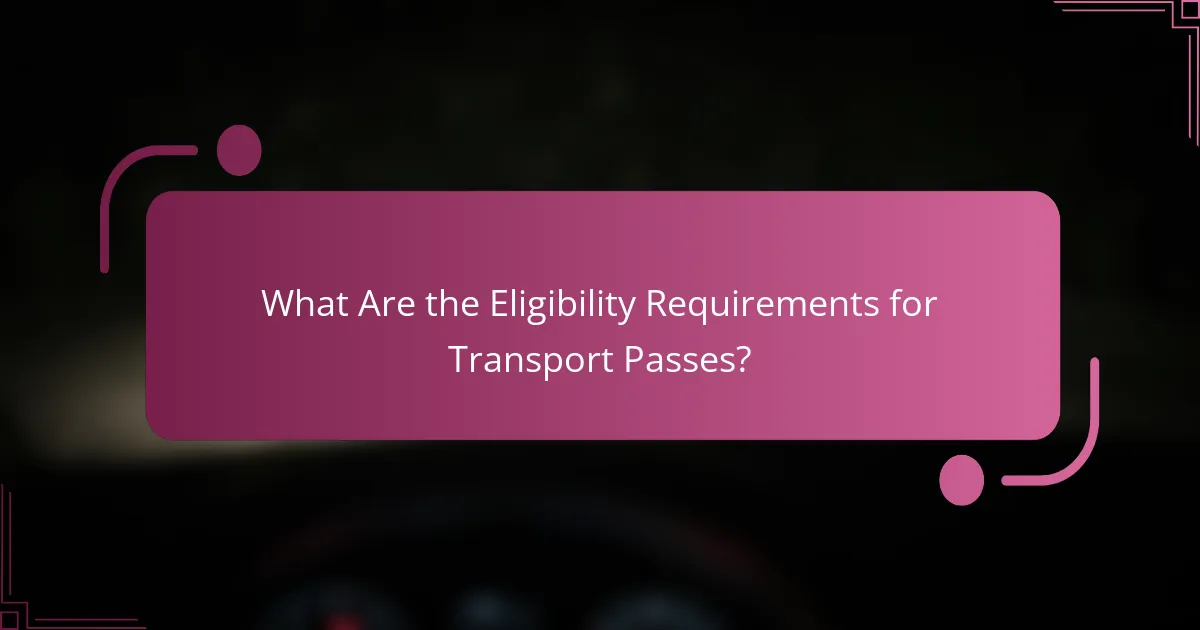
What Are the Eligibility Requirements for Transport Passes?
Eligibility for transport passes typically involves meeting specific criteria related to age, residency, and employment status. These requirements ensure that passes are distributed fairly and are often aimed at supporting certain groups such as students, seniors, or low-income individuals.
Age Requirements
Age requirements for transport passes vary by region and type of pass. Generally, discounts are available for children, students, and seniors. For instance, many cities offer reduced fares for individuals under 18 or over 65, while some may require proof of age through identification.
It’s essential to check local regulations, as some areas may have specific age brackets or additional criteria for eligibility. Always verify if a pass is available for your age group before applying.
Residency Verification
Residency verification is often a crucial part of the eligibility process for transport passes. Applicants may need to provide proof of residence, such as a utility bill, lease agreement, or government-issued ID that shows their current address.
Some transport authorities may require that applicants reside within specific zones or municipalities to qualify for local passes. Ensure you have the necessary documentation ready to avoid delays in your application.
Employment Status
Employment status can influence eligibility for certain transport passes, particularly those aimed at supporting low-income workers. Many programs offer discounted rates for unemployed individuals or those working in specific sectors such as education or healthcare.
To apply for these passes, you may need to submit proof of employment or unemployment status, such as pay stubs or letters from employers. Check with your local transport authority for specific requirements and documentation needed for your situation.
![How to Purchase Transport Passes in [City]?](/wp-content/uploads/how-to-purchase-transport-passes-in-city-4.webp)
How to Purchase Transport Passes in [City]?
Transport passes in [City] can be purchased through various convenient methods, ensuring easy access for daily commuters. Options include online platforms, physical locations, and mobile applications, each catering to different preferences and needs.
Online Purchase Options
Purchasing transport passes online is a straightforward process, typically available through the official transport authority’s website. Users can select their desired pass type, complete payment using credit or debit cards, and receive a digital pass via email or a downloadable link.
Many cities also offer discounts for online purchases, making this option not only convenient but potentially more economical. Ensure you have your identification and payment details ready to streamline the process.
In-Person Purchase Locations
In-person purchases can be made at designated transport hubs, such as train stations, bus terminals, or specific retail outlets. These locations often have staff available to assist with the selection and purchase process, which can be helpful for first-time buyers.
When visiting in-person, check the operating hours and any required identification, as some passes may necessitate proof of residency or eligibility. Be prepared for potential queues during peak hours, especially at busy transit stations.
Mobile App Purchases
Many transport authorities now offer mobile apps that allow users to purchase passes directly from their smartphones. These apps often include features like real-time updates, route planning, and the ability to store multiple passes for family members.
To purchase a pass via a mobile app, download the official app, create an account, and follow the prompts to select and pay for your pass. This method is particularly useful for commuters who prefer to manage their transport needs on the go.
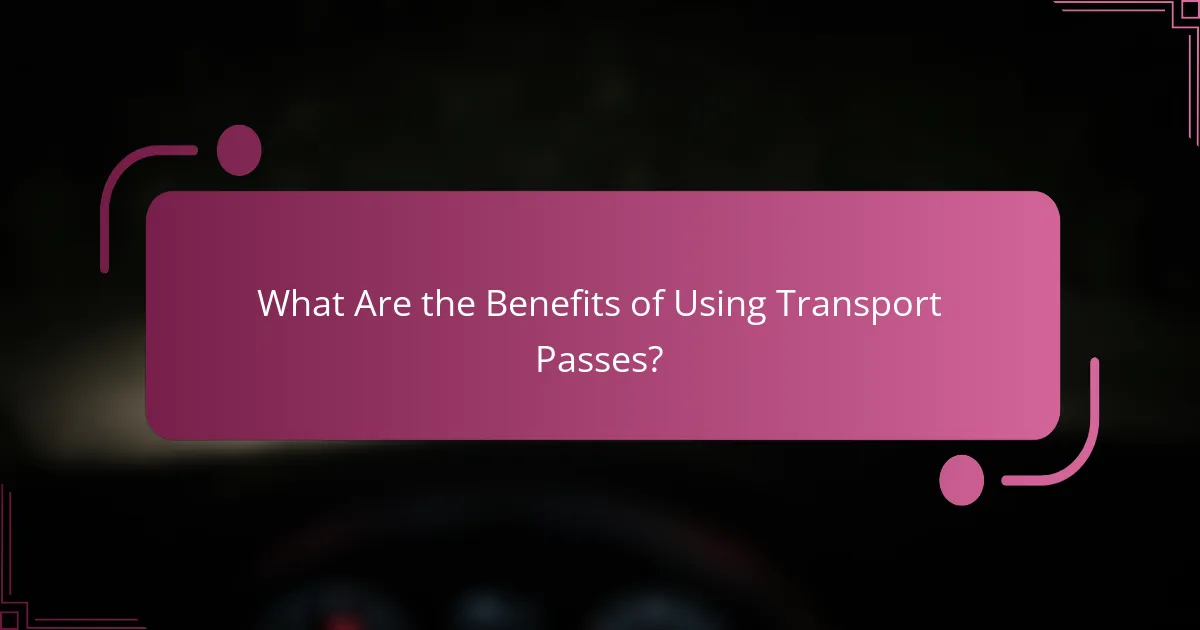
What Are the Benefits of Using Transport Passes?
Transport passes provide significant advantages for daily commuters, including cost savings, convenience, and ease of use. By consolidating multiple fares into a single payment, these passes simplify travel and often reduce overall expenses.
Convenience of Travel
Transport passes streamline the commuting process by eliminating the need to purchase individual tickets for each journey. Commuters can simply tap their pass on entry, making boarding faster and reducing wait times at ticket machines.
Many transport passes are valid for extended periods, such as weekly or monthly durations, allowing users to travel without worrying about daily fare purchases. This predictability aids in budgeting for transportation costs.
Access to Multiple Transport Modes
Transport passes often cover various modes of transportation, such as buses, trams, and trains, providing seamless travel across different systems. This flexibility allows commuters to choose the most efficient route without incurring additional costs.
For example, a monthly pass in cities like London or Berlin can be used interchangeably on multiple transport networks, making it easier to navigate urban environments without the hassle of separate tickets.
Reduced Stress During Commutes
Using a transport pass can significantly lower the stress associated with commuting. With a pass, commuters do not need to worry about carrying cash or finding the right change for tickets, which can be particularly beneficial during rush hours.
Additionally, the ability to travel across various transport modes without the need for multiple transactions allows for a more relaxed and efficient journey. This can lead to improved overall satisfaction with the commuting experience.
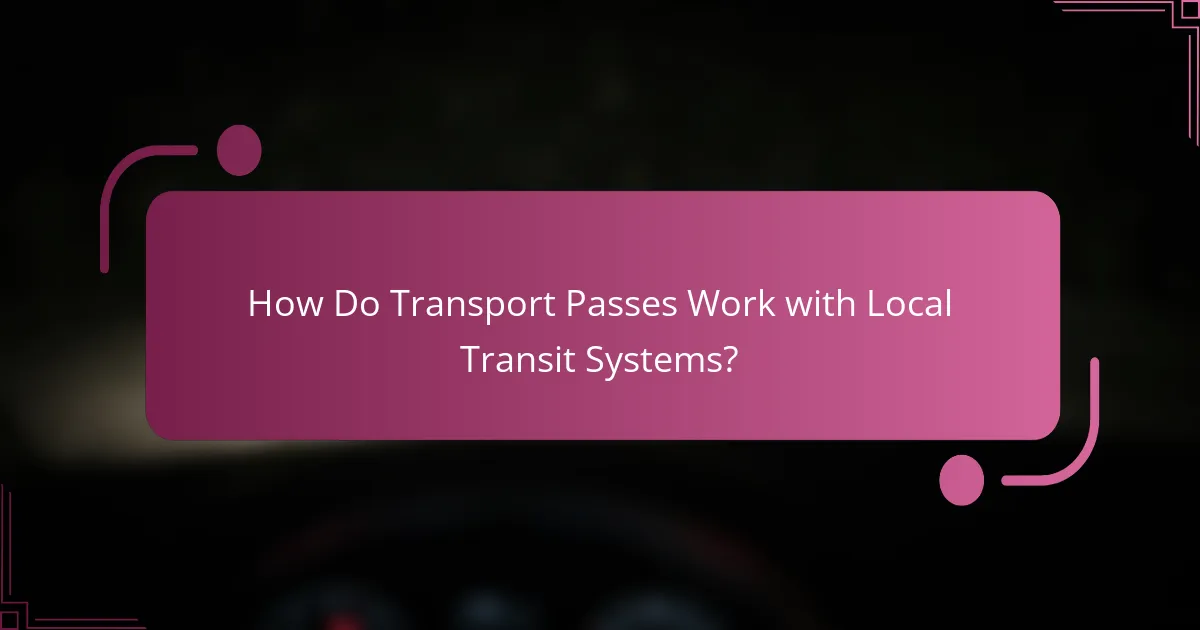
How Do Transport Passes Work with Local Transit Systems?
Transport passes are prepaid tickets that allow users to access local transit systems, such as buses, trains, and trams, often at a discounted rate. They simplify travel by eliminating the need for cash or single-ride tickets, making commuting more efficient and cost-effective.
Types of Transport Passes
There are several types of transport passes available, including monthly, weekly, and daily passes. Monthly passes are ideal for regular commuters, while weekly passes can be beneficial for those who travel frequently but not daily. Daily passes offer flexibility for occasional users, allowing unlimited travel within a single day.
Some transit systems also provide special passes for students, seniors, or people with disabilities, often at reduced rates. It’s essential to check local transit websites for specific offerings and eligibility requirements.
How to Purchase Transport Passes
Transport passes can typically be purchased through various channels, including online platforms, mobile apps, ticket vending machines, and at transit stations. Many cities offer discounts for online purchases, so it’s worth checking for promotions.
When buying a pass, ensure you select the correct type and duration based on your commuting needs. Keep an eye on expiration dates to avoid losing value on unused passes.
Benefits of Using Transport Passes
Using transport passes can lead to significant savings compared to buying single tickets for each journey. For regular commuters, a monthly pass can reduce travel costs by a considerable percentage, often making it a more economical choice.
Additionally, transport passes can save time by allowing users to board without fumbling for cash or tickets. Many systems have implemented contactless options, further streamlining the boarding process.
Common Pitfalls to Avoid
One common mistake is purchasing the wrong type of pass, which can lead to wasted money. Always assess your travel patterns before making a purchase. Another pitfall is neglecting to check for expiration dates, which can result in losing the value of the pass.
It’s also important to familiarize yourself with the rules associated with your pass, such as restrictions on peak travel times or specific routes. Understanding these details can help you maximize the benefits of your transport pass.
